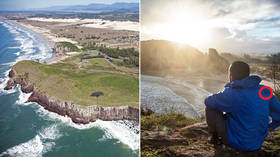Free pics turned into ads: Wikipedia outraged as North Face brags of site exploit

Clothes brand North Face has bragged about scoring free ads and top Google rankings by swapping scenic photos on Wikipedia for pictures of their clothes and calling it a “collaboration.” Wikipedia says their site was “defaced.”
The outdoor-wear outlet North Face let the world know they had gamed the free internet encyclopedia in an surprisingly honest video on Tuesday.
We photographed our brand in several adventurous places, then we switched the Wikipedia photo for ours.
While you might imagine the company would want to keep their guerrilla ad campaign quiet, or that they would at least feel a slight tinge of shame for co-opting a public information tool to enrich themselves, in their epicly soundtracked celebratory video they instead present themselves as genius entrepreneurs and adventurers for coming up with the idea.
We hacked the results to reach one of the most difficult places: the top of the world’s largest search engine, paying absolutely nothing just by collaborating with Wikipedia.
However, much like Natalie Portman rebuffing Moby’s claims that they had once dated, the Wikimedia Foundation, which maintains the reference-site, says it was less like a collaboration, and more like the brand “defacing public property.”
Yesterday, we were disappointed to learn that @thenorthface and @LeoBurnett unethically manipulated Wikipedia. They have risked your trust in our mission for a short-lived consumer stunt. 1/ https://t.co/aIl5XEkS3z
— Wikipedia (@Wikipedia) May 29, 2019
Wikipedia and the @Wikimedia Foundation did not collaborate on this stunt, as The North Face falsely claimed. In fact, what they did was akin to defacing public property. 4/
— Wikipedia (@Wikipedia) May 29, 2019
In a series of tweets the next day, the organization responded letting North Face and their advertising manager Leo Burnett know that their intrepid business maneuver was actually just taking advantage of people’s trust, along with the hard work the hundreds of thousands of people that volunteer to maintain Wikipedia.
When companies like The North Face take advantage of the trust you have in Wikipedia just to sell you clothes, you should be angry. Their actions have gone directly against the spirit, purpose, and policies of Wikipedia to provide neutral, fact-based knowledge to the world.
Volunteers then quickly removed all of the swapped photos or edited out the company’s logo.
Numerous commenters have since expressed their outrage, many promising to boycott the store in the future.
northface: we defaced a non-profit educational website because we didn't like the fact that our advertisements don't show up first in a google searchliterally everyone else: ????
— YY_moo (@5Weet_7riP) May 29, 2019
I can not foresee myself ever purchasing a North Face product after this. #boycottnorthface
— Veronika Coleman (@tippedparadox) May 30, 2019
The North Face also earned a new edition to its own Wikipedia page over the incident.

After the public outcry, the brand did respond to Wikipedia’s tweet with an apology, and a promise to do better. Not everyone was convinced, however, with most saying an apology wasn’t quite enough.
We believe deeply in @Wikipedia’s mission and apologize for engaging in activity inconsistent with those principles. Effective immediately, we have ended the campaign and moving forward, we’ll commit to ensuring that our teams and vendors are better trained on the site policies.
— The North Face (@thenorthface) May 30, 2019
If you believe in Wikipedia's mission, then you should have your ad agency issue a statement similar to yours. You wasted everyone's time so you could make more money. The tragedy of the commons is organizations that act like yours did.
— jessamyn west (@jessamyn) May 30, 2019
Nope. Bigger apology. Public. Plus a donation. And fire @LeoBurnett. Everyone has to pay here.
— Mike Monteiro (@monteiro) May 30, 2019
Like this story? Share it with a friend!













